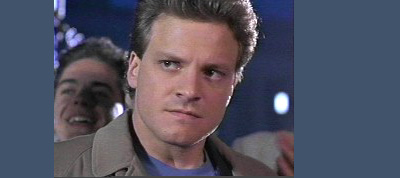
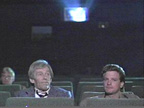
At the glittering Gala opening for the Festival, Brian Smith lines up among other fans along the red carpet. He is waiting for Valentin. Ignored and frustrated, he shoots the film star. As Brian Smith tries to escape, a spotlight (ironically) falls on him and kills him.
The next scene is shrouded in mist: a boat is gliding slowly on a sea where desperate and dark swimming figures are 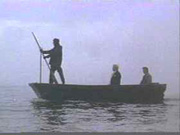 moaning. The boat is helmed by a hooded and silent Charon-like silhouette and carries Valentin and Smith. Both disembark on an island where (we soon find out) dead celebrities reside. We also learn along with Brian Smith that one's stay on the lush island (complete with resort hotel, valets and waiters) is contingent upon the fame one enjoys on Earth: "...the fame you enjoy on Earth at this moment is the only thing which gives you the privilege of being on this island." Throughout the movie, we are entertained by a gallery of quirky eccentrics: rock stars, artistes, writers, gurus and divas. Among them is beautiful Bianca, a French singer/composer who at first flirts with Valentin before finally falling for Brian Smith. Fighting to recover her memory, she is convinced the resort hotel is in reality a psychiatric hospital. Why not? Does it make more sense to believe one is dead?
moaning. The boat is helmed by a hooded and silent Charon-like silhouette and carries Valentin and Smith. Both disembark on an island where (we soon find out) dead celebrities reside. We also learn along with Brian Smith that one's stay on the lush island (complete with resort hotel, valets and waiters) is contingent upon the fame one enjoys on Earth: "...the fame you enjoy on Earth at this moment is the only thing which gives you the privilege of being on this island." Throughout the movie, we are entertained by a gallery of quirky eccentrics: rock stars, artistes, writers, gurus and divas. Among them is beautiful Bianca, a French singer/composer who at first flirts with Valentin before finally falling for Brian Smith. Fighting to recover her memory, she is convinced the resort hotel is in reality a psychiatric hospital. Why not? Does it make more sense to believe one is dead?
Valentin, snooping around the hotel, finally finds out the identity of his murderer. In a suspenseful showdown played on a diving board over an empty pool, Valentin acknowledges he stole Brian Smith's (aka Norman Eliott Trigorin) manuscript and passed it as his own. All seems forgiven. The mystery is solved as to why the writer Brian Smith murdered Valentin the star.
A big party for all the island guests is held. There, testimonials are read reflecting the current state of each guest's fame. Guests whose fame on Earth has faded are forcibly removed amid screams and gnashing of teeth and placed behind a fenced barrier, separating them from the guests who will be remaining at the hotel. Once the festivities are over, they will be thrown from the premises and into oblivion (the worst of all fates). Sadly, Valentin is one of those who has been forgotten along with Brian since his fame is linked with that of Valentin. 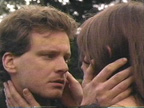
The highlight of the evening is a lottery where the winner has a chance to go back to Earth with a guest of his or her choice. Brian Smith wins but he fails to convince the confused Bianca to leave with him. He goes back to Earth with Valentin, the faded star. In the last scene, Brian Smith, full of compassion for the forgotten Valentin, humors him by orchestrating a scene where "fans" come to ask for his autograph. Valentin is content.
Lisa: This movie seems to be a parody of all the worst excesses of 60s trendy movie making.
Françoise: There is a bit of Ingmar Bergman (the hooded figure and the dead souls wailing), Resnais, Antonioni and Fellini (the shallow high society types) all thrown in. These highly artsy 60's directors all offered a self-referential and very self-conscious look at themselves. This movie is poking fun at its own esthetic preoccupations. Ingmar Bergman might have had lofty intentions but the fact is that all we have left is his insistence on style and his obscure symbolism. This movie deconstructs Ingmar Bergman and others by showing how vacuous it all is. I may not be moved to cry or laugh but I enjoy the intellectual exercise for its own sake.
self-conscious look at themselves. This movie is poking fun at its own esthetic preoccupations. Ingmar Bergman might have had lofty intentions but the fact is that all we have left is his insistence on style and his obscure symbolism. This movie deconstructs Ingmar Bergman and others by showing how vacuous it all is. I may not be moved to cry or laugh but I enjoy the intellectual exercise for its own sake.
Françoise: I was especially struck by the visual references to Alain Resnais' Last Year in Marienbad (the labyrinth, the amnesia, surrealism and psychoanalysis). Visually, Last Year in Marienbad is stunning, with geometrical checkerboard landscapes, painted shadows, and beguiling tracking shots that seem to last for minutes on end. Conceptually, it's a mind-bender that represents important breakthroughs in cinematic representations of psychology. The movie itself is puzzling and contradictory, a self-conscious work that seems only half-remembered even as it wills itself into being on the screen.
Lisa: Norman Eliot Trigorin's name is made up of 3 writers' names: Norman (Mailer), Eliot (T.S) and Trigorin (writer in Chekhov's The Seagull).
Françoise: Another allusion to the 60's: Merrick says he turned down the Nobel Prize. We are in 1966 and in 1964 Jean-Paul Sartre (whom some might consider part of the European intelligentsia of the times) had just turned down the Nobel Prize for Literature. Poking fun again!
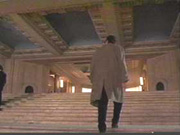 Lisa: Wings of Fame was released in 1990. It is a European pseudo-art film (made in Holland?), and directed by Otakar Votocek, in which a young man in an overcoat wanders about observing the absurdities of a kind of purgatory or hell in the after life. At the end of the movie, he is returned to life on earth, and serves as a temporary guardian angel for a has-been movie star. Wings of Desire was released in 1988. It is a European art film (made in Berlin?), and directed by Wim Wenders, in which several solid-built men in overcoats wander about unseen, observing the absurdities of hell on earth. At the end of the movie, one of these men (who are actually angels) returns to life on earth, and ceases to be a guardian angel for anybody - though he does join a circus.
Lisa: Wings of Fame was released in 1990. It is a European pseudo-art film (made in Holland?), and directed by Otakar Votocek, in which a young man in an overcoat wanders about observing the absurdities of a kind of purgatory or hell in the after life. At the end of the movie, he is returned to life on earth, and serves as a temporary guardian angel for a has-been movie star. Wings of Desire was released in 1988. It is a European art film (made in Berlin?), and directed by Wim Wenders, in which several solid-built men in overcoats wander about unseen, observing the absurdities of hell on earth. At the end of the movie, one of these men (who are actually angels) returns to life on earth, and ceases to be a guardian angel for anybody - though he does join a circus. 
Lisa: Everything is washed out -white, beige, grey, cream, black - except for Colin's little blue tee shirt.
Françoise: It seems to be noon all day long. The sun is always high in the sky. The island is stuck in time. Everything is bright and golden, but immobile (the shadow on the sundial does not move and no one ever knows what time it is -- which then underlines the presence of Einstein amongst the guests -- he is trying to refine his theory of relativity of course!). After all, we are in limbo or purgatory!
Lisa: I enjoyed all the heavily underlined parallels: Valentin luxuriating at full length in a marble bathtub, waited on hand and foot, set beside Colin lying on a cheap bedstead in his depressing hotel room, with a flickering light. Ah the fleeting joys of fame! Later, there's a nice moment, definitely done with comedy in mind: Valentin needles Horace T. Merrick (Robert Stephens) about his novel The Eve of Gravitation, about a young man - and in the background of the shot, a fat old man falls with enormous gravitational force and no grace whatsoever into the swimming pool from the high diving board.
Françoise: It is a very funny movie. Lassie is there among the famous. Even the flirtatious interaction between Bianca and Brian is very comic at times.
Lisa: Everyone (except 'normal' Brian) is just a little bit too far over the top. And how can you not enjoy the utter silliness of the anarchists, and the scene where the hotel manager calmly tosses away the molotov cocktail? And the scene where Brian gets hit on the head with a falling light is hilarious - completely fake.
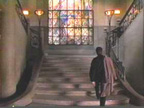
"...very strange and very funny" [Time Out]
"Well I'm playing a struggling writer... and I kill Peter O'Toole, and die in the process." [Film Review, September 1989]
About Fame
"I'd be very frightened if I suddenly found myself famous. Real fame would be an insane thing to want."
"If you meet people who have been successful in Hollywood, or look at their photographs, you see a haunted look in their eyes, you sense a trapped feeling."
"I've had people saying, 'Oh come on, you love it,' but what's fun about someone taking pictures through your window? It gives me the jitters..."
About Comedy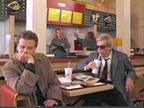
"I don't often get funny lines. No one's realized I can do comedy."
"...in a way, it's not your job to be funny. Your job is to take yourself all too seriously and hence the comedy, I suppose."
[Premiere, UK, March 1997]
Sandra: There are so many scenes where Colin's face says it all. When Valentin first asks him why he killed him, you see the moment when 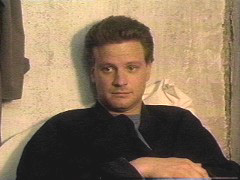 Brian (Colin) decides that he will not give Valentin a direct answer - on his face. When Valentin tells Brian his pathetic little story about arriving in New York broke and spending a cold winter in an unheated hotel, Brian's face is full of mockery when he corrects all the inaccuracies in the story. I was particularly taken with Colin's face during the crowd scene at the beginning of the movie when he is in the midst of all of Valentin's fans, trying to get his attention. There is such desperate determination in that look!
Brian (Colin) decides that he will not give Valentin a direct answer - on his face. When Valentin tells Brian his pathetic little story about arriving in New York broke and spending a cold winter in an unheated hotel, Brian's face is full of mockery when he corrects all the inaccuracies in the story. I was particularly taken with Colin's face during the crowd scene at the beginning of the movie when he is in the midst of all of Valentin's fans, trying to get his attention. There is such desperate determination in that look!
Françoise: Just as in The Advocate, Colin plays a subtly comic character. Watch him cleaning his ear most unromantically after lovely Bianca whispers an assignation or storming out of a guru seance and getting slapped in a most undignified manner or mistaking Lassie the dog for Bianca!!
Sandra: For me, one of the most impressive scenes regarding Colin's acting is the confrontation between Valentin and Brian on the diving board over an empty swimming pool. Valentin has pushed Brian causing the railing to collapse, leaving Brian hanging in mid-air. Valentin refuses to help Brian back safely onto the board until Brian realizes he has to give Valentin a reason to save him - a discussion of one of Valentin's performances! Once safely back on the board, Brian confesses to never having seen the film. In spite of all of the tension in this scene, Colin delivers some extremely funny lines with just the right smart-aleck nonchalance of Brian Smith.
Françoise: Wings of Fame is a film which mocks self-involved, pretentious movie-making and at the same time manages to make serious points about the nature of fame. Colin seems to enjoy this satire quite a bit.
****************************************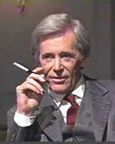 | Reporter: What do you think of British Cinema? Valentin: Oh, that would be a very good idea! |
****************************************
Dr. Frisch: As a matter of fact, the fame you enjoy on earth at this moment is the only thing which gives you the privilege of being on this island. Every now and then, there's a selection and if you have been forgotten on earth... off you go into the mist of oblivion just like all the others who live and die anonymously.
Brian Smith: So where are we? What is this place exactly?
Dr. Frisch: I wish I could tell you. A waiting room... a purgatory perhaps... You might even call it Hell since so many of us are more afraid of oblivion than of death.
*******************************************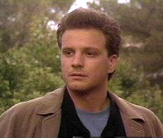
Brian Smith: And that's Lassie, I suppose?
Dr. Frisch: Yes.... The famous movie dog, and she is dead too.
*******************************************
Merrick: The simplicity of the actor's mind is fascinating. You must make a novel... a very short novel.
Valentin: What would that be? Only 200 pages?
************************************************
Brian Smith: Dr. Frisch, do you believe there is love after death?
Dr. Frisch: What do you mean precisely?
Brian Smith: I mean the love of a man for a woman.
Dr. Frisch: Here in this place? Impossible! The only states of mind I have observed here are jealousy, vanity and boredom.
Brian Smith: Are you sure?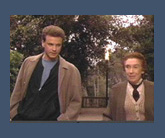
Dr. Frisch: Positively.
Brian Smith: It's funny...
Dr. Frisch: What?
Brian Smith: It doesn't matter.
****************************
Valentin: Pretty strange place we ended up in, Mr. Smith.
Brian Smith: Well...I imagine it is a lot stranger to you than it is for me.
Valentin: Oh? Why is that?
Brian Smith: Well, it must be hard for you here without all your fans, the attention, the applause, all those things you took for granted.
Valentin: I took nothing for granted. It took damned hard work to earn it.
**********************************************
Valentin: My life in the limelight... and beyond the light, squalor. Faces, all those faces, countless faces, false smiles, envious eyes, poisoned kisses, honey-tongued voices, flattery, gossip, deadly wit, little lies, big lies, betrayal, unfulfilled promises. Applause, praise, adoration... I thought it was love... May I tell you something? I miss it. I really, really miss it, all of it. Incredible!
***********************************************
Master of Ceremony: At the end of all time, oblivion will catch up with all of you.
Valentin: He's a born comedian. Don't you think?
***********************************************

* Marie Trintignant is the daughter of Jean-Louis Trintignant ( A Man and a Woman, 1966)
* This is the fifth movie in which Colin has a head injury (Apartment Zero, Tumbledown, The Advocate, Lost Empires).
* Czech director Votocek had emigrated to Holland as an expert in nuclear chemistry and returned to his homeland twenty years later as the director of Wings of Fame.
* Colin played for another Czech director in exile (Forman) at about the same time.
2. From Jeff Meyer -- IMDB:
This is one of those films with an absolutely wonderful concept, some of which is realized on the screen, and some of which isn't. Peter O'Toole plays a famous movie actor whose work is being shown in a retrospective at a European film festival. Colin Firth plays a young writer who is desperate to see him, apparently due to something O'Toole's character has done to him. At the opening of the festival, frustrated because he cannot talk to O'Toole, Firth shoots and kills the actor -- and is subsequently killed himself by a falling spotlight. 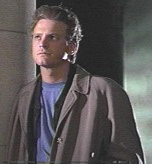 Well, they're both dead, and end up being ferried by a Charon-like boatman to an island, surrounded by swimming, moaning souls. On the island is a hotel reserved for those whose fame still lives on Earth, even after their deaths. Of course, when your fame begins to fade... out for a swim you go. The vision of the afterlife has any number of attractions and neat ideas, some of which are realized, some of which aren't. There are some tedious moments in the beginning, but once O'Toole and Firth confront one another, it improves markedly. At times, it's sort of a reversed, relatively superficial twist on WINGS OF DESIRE; but the film has well-timed bizarreness, a good sense of desperateness, and a strong ending. Firth is his usual strong character, and O'Toole surprised me by only walking through about half of it -- he really woke up at points. Worth taking a look at, really.
Well, they're both dead, and end up being ferried by a Charon-like boatman to an island, surrounded by swimming, moaning souls. On the island is a hotel reserved for those whose fame still lives on Earth, even after their deaths. Of course, when your fame begins to fade... out for a swim you go. The vision of the afterlife has any number of attractions and neat ideas, some of which are realized, some of which aren't. There are some tedious moments in the beginning, but once O'Toole and Firth confront one another, it improves markedly. At times, it's sort of a reversed, relatively superficial twist on WINGS OF DESIRE; but the film has well-timed bizarreness, a good sense of desperateness, and a strong ending. Firth is his usual strong character, and O'Toole surprised me by only walking through about half of it -- he really woke up at points. Worth taking a look at, really.
3. From Nigel Floyd -- Time Out Film Guide:
Outside a festival première of his latest movie, celebrated '60s actor Cesar Valentin (O'Toole) is shot by agitated fan Brian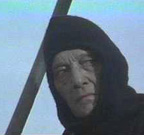 Smith (Firth), who is in turn killed by a falling spotlight. Transported across a Styx-like river to a purgatorial hotel, they join a variety of celebrities whose continuing occupancy (and quality of accommodation) depends on how well their mortal faith is holding up. Einstein plays the violin while Lassie sniffs around, and Hemingway rubs shoulders with such lesser immortals as Horace T. Merrick (Stephens), famous for refusing the Nobel Prize for literature. So while O'Toole probes his assassin's obscure motives, Firth sustains his fit of pique and concentrates on pursuing the beautiful, amnesiac Bianca (Trintignant). Although the pacing is a shade too measured, the striking hotel setting and deft plot twists hold the attention throughout, especially in the weirdly funny finale, a game show lottery in which contestants are given the chance to return to the real world. Classily shot by veteran British cinematographer Alex Thomson, filmed in English by Czech director Votocek, this gentle allegory is slyly funny and quietly satisfying.
Smith (Firth), who is in turn killed by a falling spotlight. Transported across a Styx-like river to a purgatorial hotel, they join a variety of celebrities whose continuing occupancy (and quality of accommodation) depends on how well their mortal faith is holding up. Einstein plays the violin while Lassie sniffs around, and Hemingway rubs shoulders with such lesser immortals as Horace T. Merrick (Stephens), famous for refusing the Nobel Prize for literature. So while O'Toole probes his assassin's obscure motives, Firth sustains his fit of pique and concentrates on pursuing the beautiful, amnesiac Bianca (Trintignant). Although the pacing is a shade too measured, the striking hotel setting and deft plot twists hold the attention throughout, especially in the weirdly funny finale, a game show lottery in which contestants are given the chance to return to the real world. Classily shot by veteran British cinematographer Alex Thomson, filmed in English by Czech director Votocek, this gentle allegory is slyly funny and quietly satisfying.
4. From D.P in Studio magazine (June 1991):
Les Ailes de la Renommée
Ce film réalisé par Otakar Votocek, un Tchèque, a fortement impressionné le jury du festival d'Avoriaz qui lui a accordé son Prix Spécial de l'étrange. Etrange, le mot n'est pas abusif pour ce film dont tous les personnages vivent dans l'au-delà. C'est d'abord l'histoire d'un jeune et obscur écrivain (Colin Firth) voulant à toute force rencontrer une star de cinéma (Peter O'Toole). Pleine de morgue et de suffisance la star écrase de son mépris le malheureux groupie qui, humilié et déçu, le tue à coups de revolver, avant de disparaître lui-même accidentellement. Le film nous embarque alors dans un lieu bizarre, une île-purgatoire, où les célébrités vivent leur mort. Et le confort de cette vie post-mortem est proportionnel à la pérennité de leur notoriété ici-bas. Plus la gloire est durable sur terre, plus la suite est merveilleuse dans l'hôtel des demi-dieux. En revanche, si le temps, qui efface tout, vous fait tomber dans l'oubli, vous finissez par croupir dans les caves. La métaphore n'est pas convenons-en, d'une grande légèreté. Toutefois, le traitement du récit, l'interprétation décalée des acteurs, et le culot des situations, font qu'on se prend au jeu cruel de ce film un tantinet cynique.
(Translation by Françoise)
This film directed by Otakar Votocek, a Czech national, has greatly impressed the jury of the Avoriaz Festival who bestowed on it its Special Prize for the Uncanny. Uncanny, the word is not too strong for this film where all the characters live in the beyond. It is foremost the story of a young and obscure writer (Colin Firth) wanting to meet a movie star (Peter O'Toole) at all costs. Full of arrogance and self-importance, the star squashes with contempt the unfortunate groupie who, being humiliated and disappointed kills him with a revolver before dying accidentally. The film takes us to a bizarre place, an island-purgatory where celebrities live after their death. And the comforts afforded in this post-mortem life are proportional to the perenniality of their notoriety here on earth. The more lasting one's glory is on earth, the more marvellous is the suite in the demi-gods' hotel. On the other hand, if time which erases all, throws you into oblivion, you end up stagnating in the cellar. The metaphor is admittedly not very elegant. However the handling of the narrative, the off key interpretation of the actors and the daring of the situations cause us to fall for the cruel game of this slightly cynical film.
5. Première (May 1998) Marie Trintignant comments on the film: 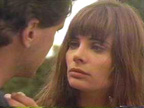 MT: C'était le film d'un Tchèque presque aveugle. C'était drôle, il regardait le combo avec des jumelles. Avec Peter O'Toole et Colin Firth. Une assez jolie histoire sur une espèce de paradis des gens célèbres. Et le directeur de la photo était celui de Cimino sur Voyage au Bout de l'Enfer. Dans le film il y avait trois quarts d'heure bien et trois autres moins... Mais ne parlons pas de ça parce que je suis d'une sévérité incroyable avec les films!
MT: C'était le film d'un Tchèque presque aveugle. C'était drôle, il regardait le combo avec des jumelles. Avec Peter O'Toole et Colin Firth. Une assez jolie histoire sur une espèce de paradis des gens célèbres. Et le directeur de la photo était celui de Cimino sur Voyage au Bout de l'Enfer. Dans le film il y avait trois quarts d'heure bien et trois autres moins... Mais ne parlons pas de ça parce que je suis d'une sévérité incroyable avec les films!
(Translation by Françoise)
It was a film by a Czech who was almost blind. It was strange, he would look at the combo with binoculars. With Peter O'Toole and Colin Firth. A rather pretty story in a kind of paradise for famous people. And the director for cinematography was also Cimino's cinematographer in The Deer Hunter. In the film there were 45 minutes which were good and 45 which were less so. But let's not speak about that because I am incredibly strict when it comes to films!
Rating System
| ***** | Superb/breathtaking/heartstopping |
| **** | Excellent |
| *** | Very pleasing |
| ** | Still lovely, but... |
| * | Bad hair day |
| ***** | Colin's looks |
| ***** | Colin's acting ability |
| **** | The film in general |
| **** | Ranking in the films of Colin Firth |
| ***** | Watchability & rewind factor |
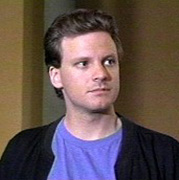 This page was designed by Sandra and Françoise, written by Françoise, and assembled by Sandra
This page was designed by Sandra and Françoise, written by Françoise, and assembled by SandraSnappy photos taken from video by Sharon